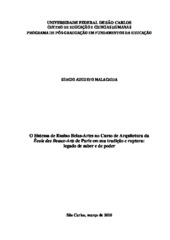O Sistema de Ensino Belas-Artes no Curso de Arquitetura da Ècole des Beaux-Arts de Paris em sua tradição e ruptura: legado de saber e de poder
Resumo
The Fine-Arts Teaching System, founded by the École des Beaux-Arts of Paris in its Architecture Course, which lasted from 1671 to 1968, is considered to be a supreme asset of cultural and symbolic importance in which the traditional school, related to the French capitalist state, was expressed. Furthermore, it is also understood to be cultural capital which merits preservation. The history of the École, the world's most famous institution for the teaching of art and which has influenced the installation of ramifications of its model in various countries, reveals a series of crises which culminated with the final catastrophe in 1968, when the Architecture Course was closed and the competition for the Great Prize of Rome was discontinued. Throughout its history the École always maintained its base in relationships with powerful groups related to the nobility and influenced by prestige, status, pleasure and knowlege. These facts serve to explain the political and cultural processes which have preserved the important relevance of the Fine-Arts Teaching System. Power is an intrinsic factor of art and of the understanding of its essence, originality and knowledgepower, and this is evident and explicit in the formation of the systematised enlightenment of Graeco-Roman classicism conceived in the neoclassic style and practised rightly by the famous French school. The "rigid"classic rules, on being systematised, became powerknowledge to benefit primarily the aristocracy, the monarchical State and afterwards the interests of an authoritarian State regime. The closure of the Architecture Course and the extinction of the Great Prize of Rome Competition , while confirming the phenomenon of genealogical power, exposes the problem of non-flexibilisation of Education in the political and cultural areas in order to defend, above all, the knowledge-power of art in the classic model of Fine-Arts. The industrialisation and growth of the cities and the emergence of new social and political structures, together with their "utopias", are facts which have changed the positive power of classic works to that of technology and of engineering, thus giving origin to modern archtecture. These developments were not considered in relation to the principles of Graeco-Roman culture, which were founded in humanism as represented in the poetry of expression of sensitivity and of emotion. In this respect research indicates defence of the educational principles of a school interested in art and archtecture and focused on the potential it has for the communication of knowledge. In such connection, it should be remembered that schools in general, obsessed as they are by the spirit of commercial objectivity, tend to favour the power-knowledge attitude. Nevertheless, the knowledge-power of the Fine-Arts Teaching System can be saved and should be appreciated as the basic teaching value of a school disinterested in power without knowledge, which is to say power that is not intrinsically art.
